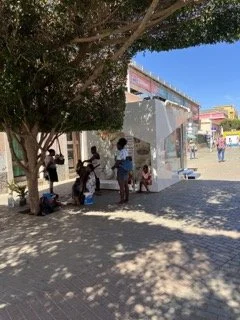The Man Who Stole My Paint Water
Praia, Cape Verde- December 2022
After a few days in Praia, I decided to spend the day (with the perfect breeze-to-sun ratio) on the front patio of my hotel, painting. Deciding on what to paint is always a struggle for me. The longer it takes me to decide, the less motivated I am to paint. Because of this, I wanted to reduce the amount of barriers to putting paint on paper as much as possible, so I chose a photo I took with colors I enjoyed within 5 minutes.
The hotel restaurant told me that they did not have an old cup I could use for my paint water, so I went across the street to the convenience store to buy a small glass cup. I then went into the lobby bathroom to fill the cup with water. I had to carry all of my shit with me because I could not leave it outside on the table unattended (downside of solo travel). Already there were too many barriers for my brain to maintain the same amount of motivation to paint.
I finally got back outside to the table, set up my space, and began the sketch. Right on the cusp of “The Zone,” a man walked up to me speaking Portugese Creyol. This was not out of the ordinary, many people walked up selling phone chargers and belts throughout the day. Knowing that I did not want a phone charger nor a belt, I did not look up from my sketchbook and waited for the waiters to shew the young entrepreneurs away like flies.
When this man was still standing there after more seconds than the usual salesman (they were all men, never a woman), I looked up and struggled to understand what he was saying. I looked around for a waitress and did not see one, so I tried to explain to the man that I could not speak Creyol. That’s when I noticed that he was not wearing pants or underwear. That’s right, full uncircumsized dick and balls hanging out.
He was experiencing homelessness. But even more so than the usual beggars. His naked vulnerability was forced, so it did not have the usual air of bravery that tends to accompany vulnerability (especially in a man). He pointed to my paint water. With a confused look, I shook my head, “no.” Next, calmly, as if I had offered it, he grabbed the water and poured half of it into a brown-stained paper cup of his own.
I had not yet dipped paint in the water so, fortunately, it was still clean. However, in my mind, the water was designated for paint so it was already tainted. I tried, stupidly, in English, to tell him that the water was not safe to drink. He kept walking.
At this point, the waiter-advocates were back and everyone there on the patio had seen the interaction. I looked around and assumed they would be indifferent. Like I said, beggars and salesmen come by all day to intrude on hotel customers’ dining experience. They would expect it to happen while they went back to the kitchen for a few minutes. But you know what Black people say about when you assume: you make an ass out of ‘u and me. Everyone stared back at me with big, surprised eyes. I knew then that this was abnormal, even for them. They whispered and their eyes went from surprised to apologetic. Suddenly, I felt embarrassed.
Why would I be embarrassed? Looking back on it, maybe it is because I felt taken advantage of. I, a naive American tourist woman, could not defend herself against a man so poor, his dick was out for the world to see. I mean he asked for water, not even money like the other beggars.
After my embarrassment wore off, I could not stop thinking. I had so many questions. How could I, a leftist, progressive social worker, advocate for people experiencing homelessness (did you catch the person-first language?), react so coldly to him? How did he get in that situation? Where was he coming from? Where was he going? Is it helpful to give quick money or food to people experiencing homelessness? What is his story? What is he doing now? Why hasn’t he left my mind?
How could I-a leftist, progressive social worker, and advocate for people experiencing homelessness (did you catch the person-first language?)-react so coldly to him?
I am human. And I don’t mean that in an “everybody-makes-mistakes” type of way. What I mean is that as a human, I am not above human and social psychology. When a group of people around me act a certain way, I will act the same. This is helpful evolutionarily (to keep me alive): if I see other people running, I’m going to run first and decide if there is actually a threat present later. So when others act cold toward people experiencing homelessness, I will first do the same, instinctually, before acting rationally and logically in the situation.
There is also an evolutionary social likeness factor: I will align with the behaviors of others to strengthen the bond so that they will want to share resources with me later (humans are social creatures). In other words, in order to align myself with people that will help keep me alive, I want to make sure they like me, which often means acting like them. Even knowing, logically, what effects social psychology has on me and others, I am, first, an experiencer of it. This means that these behaviors are not just a matter of not doing, but that of un-learning, a much more complex task.
Add to all of this the layer that I am in a place that I am not familiar with which, as a human, means that I’m already vulnerable to threats, so I’m going to be much more motivated to align myself with a dominant group.
No matter how complex humans have gotten, all of our behaviors boil down, in a nice pot of red beans and rice, to those that surround staying alive and reproducing.
How did he get in that situation?
The ultimate question, right? Some may say he is lazy and didn’t take advantage of the many opportunities to pull himself up by his bootstraps. But “Some” are not writing this, I am. I believe that the reasons are intersectional. Obviously, I do not know the exact reason he got in the situation that he is in. I’m not going to guess. My goal is to share how there are often so many resources available for people experiencing homelessness (at least in the United States), but that does NOT mean that those resources are accessible. For example, if the state offers free shelters and the only rule is (although rarely is there only one rule) that a person must be sober to stay there, that is a HUGE problem. I’ll number why that is a problem for your convenience:
If you are experiencing homelessness, one of the most traumatic experiences for the human brain and body, you (by “you,” I mean your brain and body) are going to want something to cope with that experience. Drugs are easily accessible; much easier to access than therapy. It’s like wanting your favorite drink after a long day, except this “long day” is long-lasting with no end in sight, x100000 worse, and life-threatening.
Unfortunately, this accessible coping mechanism has become an addiction-a substance-abuse disorder. Asking someone to be sober in order to “earn” a basic need like shelter is like hanging the best food above a person who is a paraplegic and telling them that they have to stand or they can’t eat. It’s cruel and inhumane. It also shows a gross lack of competence around substance-abuse disorder and human needs. There is a vast selection of research on substance abuse disorders on the SAMHSA website if you want more information.
Then, there is still no option for substance abuse treatment that is accessible, free of cost, and of necessary quality. There is nothing in the shelter (because if they were in the shelter, they would already be sober). And there damn sure isn’t anything on the street.
This is just one example of one way that one type of service for people experiencing homelessness is inadequate (in the United States, at least).
Is it helpful to give quick money or food to people experiencing homelessness?
I am by no means claiming to be an expert, but I am claiming to be an opinionated Black woman. That being said, my opinions are never fully developed, so here is my current one. I think that the answer to this is yes and no. Yes, because if this $5 is going to get you food to stop you from starving, or drugs to stop you from depression-induced suicide (although the drugs can also kill), then I’m going to give the money. And by the way, it is not for me to police what people do with the money. If I have to police what they do with the money, then I just wouldn’t give it in the first place.
No, because it could be a bandaid, not necessarily for people experiencing homelessness, but for the giver. When we give a person experiencing homelessness money, we get an ego-boost and often feel like we can kick our feet up because we have solved homelessness in that short interaction. Ha, cute. The reality is that that action did nothing to solve homelessness (doesn’t mean it has no value). We need to put in more work toward building sustainable systems that serve everyone, including people experiencing homelessness.
I like to use the train metaphor for questions like this: there are two trains. One is already en route, but it is breaking down. The other is being built and is brand new and is expected to be in great condition. You get to decide which train you want to take on your next trip, the one breaking down, or the new one (but you have to wait and work to build the new one). So, we need a current, quick solution to protect the people on the train that is breaking down, but we need to keep working on the new train so that we don’t have to rely on the broken down train forever-that is systems change versus providing a resource (the resource being, giving someone money or food). If you have a food bank without addressing the real reason why everyone doesn’t have stable access to food, then you will always need food banks. In short, we need food banks for now while we work to accomplish a more sustainable solution.
In curiosity,
Meghan





